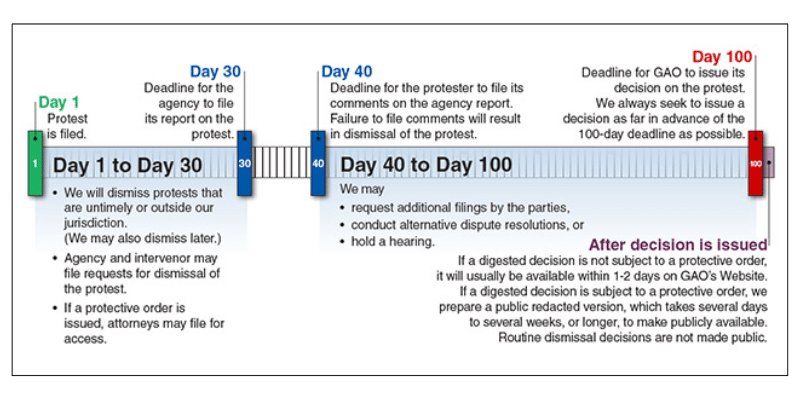What is a Bid Protest?
One of the unique aspects of contracting with the federal government is the ability to “challenge…the award or proposed award of a contract for the procurement of goods and services or…the terms of a solicitation for such a contract,” commonly referred to as a bid protest.[1] Bid protests are part of the procurement process and are designed to “ensure that federal procurements are conducted fairly” and “in accordance with numerous acquisition laws and regulations.”[2],[3]
Protesters can file a protest with the agency awarding the contract, the Government Accountability Office (GAO), or U.S. Court of Federal Claims (COFC).[4] Protesters can file pre-award protests challenging the solicitation terms or post-award protests challenging the contract award. The party with the winning proposal or “bid” can also participate in the bid protest process as the intervenor, assisting the agency in defending its award decision.[5]
It is worth noting that bid protests may also be filed at the state or local level. For example, the Code of Virginia states, “Any bidder or offeror, who desires to protest the award or decision to award a contract, shall submit the protest in writing…no later than ten days after the award or the announcement of the decision to award.”[6]
This blog post focuses on the fundamentals of protests filed with the GAO.
Timeline of Protests at the GAO
Bid protests filed with the GAO follow a 100-day timeline, as shown in the image below. A protest challenging a contract award must be filed within 10 days of when “the basis of protest is known or should have been known.”[7] Key filings following the initial protest include:
(1) the agency’s report (AR) responding to the protest within 30 days of the protest’s filing and
(2) the protester’s and, if applicable, the intervenor’s comments on the agency’s report within 10 days of the AR filing.
If new information becomes available during this process, the protester may also file a supplemental protest raising any additional grounds being challenged, again within 10 days of when the basis is known or should have been known. After all protest grounds and comments are filed, the GAO may request a hearing, although in fiscal year 2023, the GAO only conducted hearings for 2% of protests.[8] The GAO makes its decision within 100 days of the initial protest filing.[9]

GAO Bid Protest Timeline[10]
Potential Protest Outcomes
Protesters may raise a wide range of legal, technical and cost-related issues. For example, a protester may argue the solicitation terms lack clarity or that the agency unreasonably evaluated its cost or price proposal, conducted unequal discussions amongst offerors or unreasonably evaluated its technical proposal.
Regardless of the issues raised, bid protests have five potential outcomes:
(1) The agency takes corrective action (i.e., voluntarily addresses a protest concern, such as re-evaluating a proposal);
(2) The protester withdraws the protest;
(3) The GAO dismisses the protest for procedural reasons, (e.g., the protester did not file on time);
(4) The GAO denies the protest for lack of merit; or
(5) The GAO sustains the protest (i.e. recommends the agency take corrective action). [11]
How can VERTEX help?
VERTEX personnel have been admitted under protective orders at the GAO and COFC to assist both protesters and intervenors in analyzing cost, pricing and schedule issues, including the nexus between technical approaches and practical implications for an offeror’s pricing. We have experience assessing cost and price realism and reasonableness and have authored declarations on behalf of intervenors and protesters. VERTEX’s analyses often include evaluating professional compensation under FAR 52.222-46, Evaluation of Professional Compensation for Professional Employees, evaluating the Agency’s cost analysis and realism determinations, and analyzing impacts of different assumptions on the protester’s or intervenor’s most probable cost or price.
For more information on bid protests in relation to government contracts, please contact Kelsey Bonner, call +1.781.952.6000 or submit an inquiry.
References:
[1] https://www.gao.gov/legal/bid-protests/faqs
[2] GAO Bid Protests at GAO: A Descriptive Guide, May 2018.
[3] https://www.gao.gov/legal/bid-protests/search
[4] FAR 33.102, General.
[5] https://www.gao.gov/legal/bid-protests/faqs
[6] Code of Virginia at §2.2-4360, Protest of award or decision to award.
[7] 4 CFR Part 21, Bid Protest Regulations, § 21.2, Time for filing.
[8] U.S. GAO Bid Protest Annual Report to Congress for Fiscal Year 2023.
[9] 4 CFR Part 21, Bid Protest Regulations.
[10] https://www.gao.gov/infographic/timeline-bid-protest-process




